Race



The Edmund Pettus Bridge was named after a Confederate general who became a Grand Dragon in the Ku Klux Klan. His name, still emblazoned over the top of that now famous bridge, was a powerful and threatening symbol of white power and supremacy in Selma, Ala. The Student Non-Violent Coordinating Committee (SNCC) had at one time removed Selma from their list of places to organize because “the white folks were too mean, and black folks were too afraid."
But that didn’t deter a group of courageous African Americans from marching across that bridge a half-century ago, risking their lives for the right to vote in America. They were attacked and beaten by the fierce forces, led by notorious Sheriff Jim Clark, for their resistance to the frightening violence of white power.
Last Saturday, during the 50th anniversary event of “Bloody Sunday,” I spent many hours just looking at that bridge. The words that kept coming to me were “courage” and “resistance.” My question became: what bridge we will now have to cross?
Congressman John Lewis, whose skull was cracked that day as a young man, opened the main event.
"On that day, 600 people marched into history … We were beaten, tear gassed, some of us [were] left bloody right here on this bridge. … But we never became bitter or hostile. We kept believing that the truth we stood for would have the final say.”
Then Lewis introduced the president, "If someone had told me, when we were crossing this bridge, that one day I would be back here introducing the first African-American president, I would have said you're crazy.”
What happened on this bridge, President Barack Obama said, “was a contest to determine the meaning of America,” and where “the idea of a just America, a fair America, an inclusive America, a generous America … ultimately triumphed.”
I WAS ONCE told that “racism is our nation’s original sin.” This statement jolted me. While I didn’t dispute its truth, I have come to realize racism is much more complex than this.
In order to dismantle the structural sin of racism, we have to first set it within a larger context that acknowledges racism’s sociopolitical dependency and structural interconnectedness.
First: “race” is not real. It is not a scientific category; biologically, it does not exist. Race is a social construct, something built systematically. It has no inherent value or true significance beyond what we give it. In order for race to have real social consequences—which it undoubtedly does—there must be other phenomena at work that validate, sustain, and reinforce the social significance of race.
As a result of sin in our fallen world, human bodies are appraised and given a value based upon certain criteria. As a result of sin, men are privileged over women, white skin is privileged over darker skin, able bodies are privileged over disabled bodies. Historically, certain bodies are acclaimed while others are defamed. Race plays a starring role in this larger drama of embodiment.
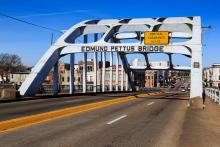
Making a whip of cords, he drove all of them out of the temple, both the sheep and the cattle. He also poured out the coins of the money-changers and overturned their tables.He told those who were selling the doves, ‘Take these things out of here! Stop making my Father’s house a market-place!’ - John 2:15,16
This is one of the most important stories in the life of Jesus. So important, that it’s one of a handful of stories that all four Gospel writers actually all share.
Even though they remember it differently.
Matthew, Mark, and Luke — they recall that this episode where Jesus entered the Temple grounds and stirred stuff up once and for all — they remember it near the end of his life. They place it as one of the main reasons that Jesus is arrested and put to death as a capitol offense against the Roman Empire.
Walking into the Temple — run by the Jewish religious elite who had been put in place by the Roman imperial oppressors — was tantamount into walking into a federal government building and blowing it up.
Except Jesus doesn’t do that. Jesus is a pacifist. Jesus is a prophet.


It was 1987. I walked across Rutgers University campus with another freshman friend. We were on our way to a meeting for Campus Crusade for Christ (now Cru). In the gobs of our gab we happened upon the topic of the recent scandalous departure of Intervarsity Christian Fellowship president, Gordon McDonald. Interim President, Tom Dunkerton, guided the organization for the next year, appointing Dr. Samuel Barkat as first VP of Multiethnic Ministries. Soon after, Dr. Steve Hayner would accept the mantle of president of the troubled organization. Over the next 13 years, Hayner guided Intervarsity into a period of stability, growth, and racial healing.
Perhaps the most significant contribution of Hayner’s leadership was his close partnership with Dr. Barkat. Together they stood on the sovereign foundations of Intervarsity’s historic struggles toward racial righteousness and guided the organization through a deep examination of its multiethnic dynamics and its white dominant culture. Ultimately, their work led the parachurch collegiate ministry through a transformative examination of its own white western cultural lens and how that lens shaped their understanding of Jesus and the gospel.

How tough is it to create a racially diverse denomination? Consider a recent luncheon organized by the Southern Baptist Convention, the nation’s largest Protestant denomination.
About 100 Nashville-area evangelical leaders accepted invitations to a lunch hosted by the denomination’s policy arm, the Ethics & Religious Liberty Commission. On the agenda: a pitch for a spring summit and a short discussion by ERLC President Russell Moore about the need for churches to become more racially diverse.
The number of African-Americans who showed up for the lunch? Four (two of them denomination employees).
ERLC leaders originally planned a summit on bioethics. They quickly shifted gears after grand juries in November and December failed to indict police officers for the deaths of young unarmed black men. Moore’s social media remarks condemning the New York City jury’s decision not to indict the officer who killed Eric Garner were met with an angry backlash, some from people filling Southern Baptist pews and pulpits.
Black church leaders are greeting news of the summit with reactions ranging from polite skepticism to hopeful support.
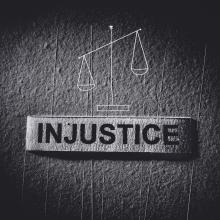
Black Future Month, a term coined by the new black vanguard, seeks to build upon the robust legacy of our foreparents while refusing to nostalgically rest upon their laurels. Black Future Month affirms our collective history of struggle, resilience, and achievement, while centering our present predicament in all its urgency. As this movement progresses, it’ll be imperative that we retain the spiritual foundation which anchored the freedom fighting of our ancestors,’ but this retention cannot come at the expense of passing the baton off to emerging leadership. We must go forward together, acknowledging that we need the collective wisdom of our people to navigate the troubled waters that surround us on all sides.
Black Future Month emerges from the #BlackLivesMater movement and the awareness that we’re in the midst of a watershed moment. There are currently “more African-American adults under correctional control, in prison or jail, on probation or parole, than were enslaved in 1850, a decade before the Civil War.” Black people currently constitute 12 percent of our nation’s populace, yet represent 40 percent of the nation’s incarcerated population. It’s estimated that 1 in every 3 black males will serve time in jail or prison in their lifetime and that 1 in 13 black people cannot vote due to felon disenfranchisement. As bleak as these realities are, mass incarceration is just a portion of the burden we’re bearing.

Revolutionary Love
Revolutionary love has given birth to new life.
We are gasping, breathing (I can’t breathe)
Screaming (We have nothing to lose but our chains)
We have been in the womb long enough
Blinking to the blinding light of the revolution
Our eyes adjusting
And we answer with what love looks like in public
Justice
I’ve been thinking about the life birthed out of revolutionary love. The night I met Waltrina, we stayed up until an ungodly hour — instant sister-friends. We bonded, talking about everything, about finding and losing faith — in God and humanity — then slowly picking it up again piece by piece, about being the diversity in mostly white professional spaces, about friends, family, and the struggle to find our places (as 30-somethings) in this “new” freedom movement.
Out of a deep revolutionary love inspired by Jesus and nourished from the well of our people, we have determined to get in where we fit in, living out the belief that there is a place for everyone in the movement.
Today's fight against the powers and principalities of systemic injustice cannot be left to the continued service of the elders that survived the 1960s civil rights movement, nor hoisted solely upon the shoulders of the teens and 20-somethings of today, just because they have energy and new ideas. Despite the focus on elders and youth, this is an intergenerational movement that requires all of us to answer the communal call. I am encouraged by one of my mentors, Mama Ruby (Sales) who says it is time to have all hands on deck.
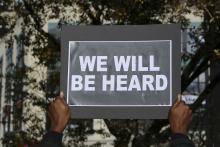
I cringed. Recently, I sat watching a cable news broadcast — can’t remember which one. What I do remember is it featured people doing good in the world … and it made me cringe.
Lots of people were highlighted, but the two young black people they featured both shared the same general narrative: So and so had a hard life. He came from poverty. She came from abuse or neglect. But they rose above. Now look at all they’ve accomplished. It was striking. None of the stories of white people started with this narrative. Rather, theirs usually went something like: Little Suzy or Johnny took a class project and turned it into a major non-profit that helps thousands of orphans … in Africa.
No matter where you tuned into this broadcast, blackness unconsciously was associated with hardship and overcoming while whiteness was associated with genius and compassion.
I sat there thinking: The truth is we have had centuries of hardship to press through. Our history is present, the good and the bad. As in Toni Morrison’s Beloved, the ghost of slavery haunts us. It affects our present. But it’s not just the past that haunts us. It is the same basic oppression of yesteryear —confinement, control, and disregard for black lives. So, it makes sense that the stories of our overcomers are as potent in current-day narratives as they are in history.
Jackie Robinson, Joe Lewis, Paul Robeson, Zora Neale Hurston, Billie Holiday, were the overcomers of our past. The black children in that broadcast were the overcomers of our present.
But what about the black future? One hundred years from now, will my family’s descendants still have to watch featured stories of black people doing good that always begins: So and so had a hard life?
During Black History Month we typically look back on all the accomplishments of those who paved the road for generations to come. But this month, we have been inspired by the #BlackLivesMatter movement to look forward to another kind of future for black men, women, and children.

On Feb. 8, civil rights attorneys sued the city of Ferguson, Mo ., over the practice of jailing people for failure to pay fines for traffic tickets and other minor, non-criminal offenses.
And to this I say: It’s about time.
Growing up with an attorney father — a “yellow dog Democrat” one at that — who often took on poor clients in return for yard work and other non-cash payments, I heard early and often about the unfair — and illegal — practice of debtors’ prison. A poor person could not be jailed for failure to pay a fine, my father told me. I trusted his words were true.
So imagine my surprise when at the age of 18, I was arrested for unpaid traffic fines.
At that time I was a stay-at-home mom, trapped in a too-early marriage I would one day leave. My son was probably 6 months old. When the knock came at my door and I saw a police officer standing outside, I didn’t hesitate to answer.
The officer confirmed my identity and told me I was under arrest for failure to pay traffic tickets I had received for driving an unregistered vehicle.
I know that I should have paid the registration. Once ticketed, I know I should have worked out a payment plan. I know I should have taken responsibility for my illegal actions.
But I was young, inexperienced with the system, and very, very poor. Too poor to keep up with even the most modest of payment plans.

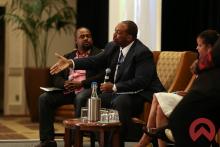

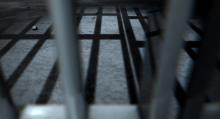
The Bureau of Prisons contacted me today, assigning me a prison number and a new address: for the next 90 days, beginning tomorrow, I’ll live at FMC Lexington, in the satellite prison camp for women, adjacent to Lexington’s federal medical center for men. Very early tomorrow morning, Buddy Bell, Cassandra Dixon, and Paco and Silver, two house guests whom we first met in protests on South Korea’s Jeju Island, will travel with me to Kentucky and deliver me to the satellite women’s prison outside the Federal Medical Center for men.
In December 2014, Judge Matt Whitworth sentenced me to three months in federal prison after Georgia Walker and I had attempted to deliver a loaf of bread and a letter to the commander of Whiteman Air Force base, asking him to stop his troops from piloting lethal drone flights over Afghanistan from within the base. Judge Whitworth allowed me more than a month to surrender myself to prison; but whether you are a soldier or a civilian, a target or an unlucky bystander, you can’t surrender to a drone.
When I was imprisoned at Lexington prison in 1988, after a federal magistrate in Missouri sentenced me to one year for planting corn on nuclear missile silo sites, other women prisoners playfully nicknamed me “Missiles.” One of my sisters reliably made me laugh today, texting me to ask if I thought the women this time would call me “Drones.”
It’s good to laugh and feel camaraderie before heading into prison. For someone like me, very nearly saturated in “white privilege” through much of this arrest, trial, and sentencing process, 90 percent (or more) of my experience will likely depend on attitude.
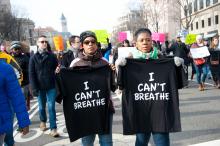
Maybe I am the only one wondering “What can I do?” as I watch and read the news of demonstrations throughout the country. I have a lot of excuses. I can’t go to the protests tonight because my son has a concert. I don’t coordinate the church service and announcements, so I can’t control what will and won’t be said. I’m on sabbatical so I won’t be a part of the conversations that I hope will happen between colleagues at meetings. But I hope I am not the only one wondering what can be, needs to be, ought to be done.
The videos are chilling – Eric Garner’s life is being choked out of him until he goes limp on the sidewalk and Tamir Rice is being gunned down, the police squad door barely opening as the officer drives by. The images of protests and protesters being tear gassed and throwing canisters back at police armed in riot gear remind me of the summer I spent in Korea, marching in protests against U.S. military presence. That was the summer I learned about wearing damp handkerchiefs near my eyes and over my nose to help with the sting of tear gas and how to wet the wick of a homemade Molotov cocktail before lighting and lobbing. A few years later in a hotel room in Indiana after a job interview, I watched protests and riots take over Los Angeles. Living with, wrestling with injustice day in and day out is a bit like a kettle of water just about to hit boiling. At some point, the water boils, the steam is released.
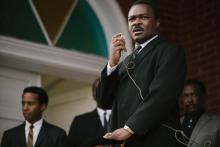
On the Rev. Martin Luther King Jr.’s birthday (Jan. 15), just as the civil rights drama Selma was nominated for best picture in the Oscar race, one fact of American life was little changed.
Sunday morning remains, as King once observed, the most segregated hour in America. And, against a backdrop of increased racial tensions, new research shows that most Americans are OK with that.
Two in three (66 percent) Americans have never regularly attended a place of worship where they were an ethnic minority, according to new polling analysis released by LifeWay Research.
“People like the idea of diversity. They just don’t like being around different people,” said Ed Stetzer, executive director of the Nashville, Tenn.-based research firm.
“Maybe their sense is that church is the space where they don’t have to worry about issues like this,” he said. But that could be a problem, because, Stetzer said, “If you don’t like diversity, you’re really not going to like heaven.”
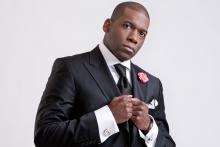
They filed into the gym Jan. 12 for an assembly about graduation and applying for colleges — an intentionally vague description that wouldn’t be out of the ordinary for a senior class.
Instead, the seniors at Normandy High School learned that full-tuition scholarships would be given to 11 of them in honor of Michael Brown, who graduated just days before he was fatally shot by a Ferguson police officer.
Ferguson’s death — and the subsequent grand jury decision not to charge the white officer with his death — set off protests and heightened racial tensions coast to coast, followed by a similar case of a unarmed black man on Staten Island who died in a police chokehold.
“The way we deal with this situation is we breathe life into you,” said George T. French, president of Miles College in Birmingham, Ala., which is offering two of the scholarships. “We believe in you, Normandy High School seniors.”
More than a dozen local and national church leaders sat in folding chairs on the gym floor, inside a high-poverty school south of Ferguson where opportunity runs short and paying for college doesn’t come easily for most.